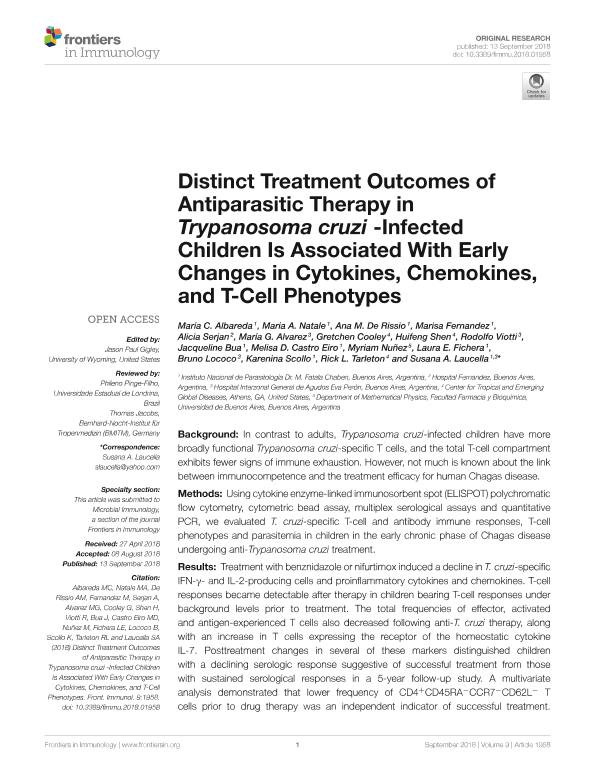Artículo
Distinct treatment outcomes of antiparasitic therapy in trypanosoma cruzi-infected children is associated with early changes in Cytokines, Chemokines, and T-Cell Phenotypes
Albareda, María Cecilia ; Natale, Maria Ailen
; Natale, Maria Ailen ; de Rissio, Ana María; Fernandez, Marisa; Serjan, Alicia; Alvarez, María G.; Cooley, Gretchen; Shen, Huifeng; Viotti, Rodolfo Jorge; Bua, Jacqueline Elena
; de Rissio, Ana María; Fernandez, Marisa; Serjan, Alicia; Alvarez, María G.; Cooley, Gretchen; Shen, Huifeng; Viotti, Rodolfo Jorge; Bua, Jacqueline Elena ; Castro Eiro, Melisa Daiana
; Castro Eiro, Melisa Daiana ; Nuñez, Myriam; Fichera, Laura Edith
; Nuñez, Myriam; Fichera, Laura Edith ; Lococo, Bruno Edgardo; Scollo, Karenina; Tarleton, Rick L.; Laucella, Susana Adriana
; Lococo, Bruno Edgardo; Scollo, Karenina; Tarleton, Rick L.; Laucella, Susana Adriana
 ; Natale, Maria Ailen
; Natale, Maria Ailen ; de Rissio, Ana María; Fernandez, Marisa; Serjan, Alicia; Alvarez, María G.; Cooley, Gretchen; Shen, Huifeng; Viotti, Rodolfo Jorge; Bua, Jacqueline Elena
; de Rissio, Ana María; Fernandez, Marisa; Serjan, Alicia; Alvarez, María G.; Cooley, Gretchen; Shen, Huifeng; Viotti, Rodolfo Jorge; Bua, Jacqueline Elena ; Castro Eiro, Melisa Daiana
; Castro Eiro, Melisa Daiana ; Nuñez, Myriam; Fichera, Laura Edith
; Nuñez, Myriam; Fichera, Laura Edith ; Lococo, Bruno Edgardo; Scollo, Karenina; Tarleton, Rick L.; Laucella, Susana Adriana
; Lococo, Bruno Edgardo; Scollo, Karenina; Tarleton, Rick L.; Laucella, Susana Adriana
Fecha de publicación:
09/2018
Editorial:
Frontiers Media
Revista:
Frontiers in Immunology
ISSN:
1664-3224
Idioma:
Inglés
Tipo de recurso:
Artículo publicado
Clasificación temática:
Resumen
Background: In contrast to adults, Trypanosoma cruzi-infected children have more broadly functional Trypanosoma cruzi-specific T cells, and the total T-cell compartment exhibits fewer signs of immune exhaustion. However, not much is known about the link between immunocompetence and the treatment efficacy for human Chagas disease. Methods: Using cytokine enzyme-linked immunosorbent spot (ELISPOT) polychromatic flow cytometry, cytometric bead assay, multiplex serological assays and quantitative PCR, we evaluated T. cruzi-specific T-cell and antibody immune responses, T-cell phenotypes and parasitemia in children in the early chronic phase of Chagas disease undergoing anti-Trypanosoma cruzi treatment. Results: Treatment with benznidazole or nifurtimox induced a decline in T. cruzi-specific IFN-γ- and IL-2-producing cells and proinflammatory cytokines and chemokines. T-cell responses became detectable after therapy in children bearing T-cell responses under background levels prior to treatment. The total frequencies of effector, activated and antigen-experienced T cells also decreased following anti-T. cruzi therapy, along with an increase in T cells expressing the receptor of the homeostatic cytokine IL-7. Posttreatment changes in several of these markers distinguished children with a declining serologic response suggestive of successful treatment from those with sustained serological responses in a 5-year follow-up study. A multivariate analysis demonstrated that lower frequency of CD4+CD45RA−CCR7−CD62L− T cells prior to drug therapy was an independent indicator of successful treatment. Conclusions: These findings further validate the usefulness of alternative metrics to monitor treatment outcomes. Distinct qualitative and quantitative characteristics of T cells prior to drug therapy may be linked to treatment efficacy.
Palabras clave:
BENZNIDAZOLE
,
NIFURTIMOX
,
PEDIATRIC INFECTION
,
T CELLS
,
TRYPANOSOMA CRUZI
Archivos asociados
Licencia
Identificadores
Colecciones
Articulos(SEDE CENTRAL)
Articulos de SEDE CENTRAL
Articulos de SEDE CENTRAL
Citación
Albareda, María Cecilia; Natale, Maria Ailen; de Rissio, Ana María; Fernandez, Marisa; Serjan, Alicia; et al.; Distinct treatment outcomes of antiparasitic therapy in trypanosoma cruzi-infected children is associated with early changes in Cytokines, Chemokines, and T-Cell Phenotypes; Frontiers Media; Frontiers in Immunology; 9; 9-2018; 1-15
Compartir
Altmétricas



